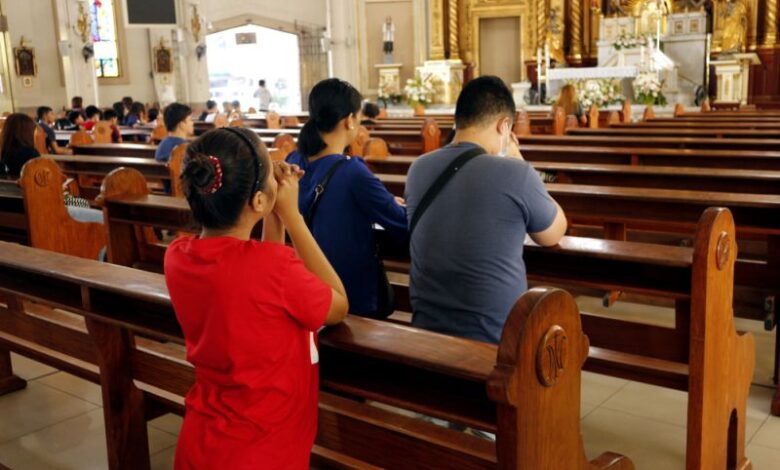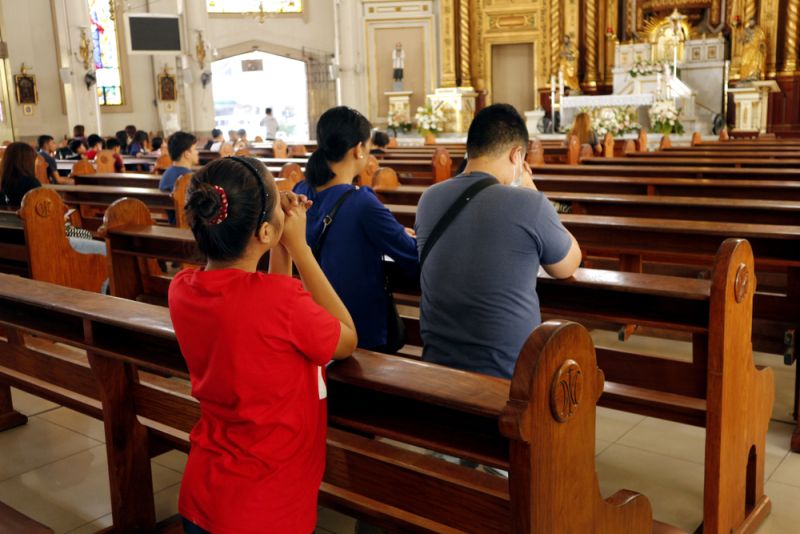Holy See encourages Catholics in Philippines to ‘listen to their pastors’ on divorce bill

 Catholic men and women kneel down and pray inside the Antipolo Cathedral in the Philippines. / Credit: junpinzon/Shutterstock
Catholic men and women kneel down and pray inside the Antipolo Cathedral in the Philippines. / Credit: junpinzon/Shutterstock Rome Newsroom, Jul 6, 2024 / 06:00 am (CNA).
Vatican Secretary for Relations with States and International Organizations Archbishop Paul Gallagher said the Holy See would encourage Catholics, particularly political leaders, in the Philippines to “listen to their pastors” regarding the latest divorce bill, which passed the country’s lower house of government in May.
At a press briefing held earlier this week, during his visit to the southeast Asian nation from July 1-5, Gallagher addressed the topic of the Absolute Divorce bill, which passed the Philippines’ House of Representatives on May 22 with 131 votes in favor of the bill. One hundred and nine members of the house voted against the bill and another 20 declined to vote.
According to CBCPNews, the official news service of the Catholic Bishops’ Conference of the Philippines (CBCP), Gallagher said the teachings of the Catholic Church on marriage are “very clear and very well known” and that the CBCP and individual bishops of each diocese must be pastors who offer couples and families “the best approach” when it comes to overcoming marital problems and marriage breakdown.
“And at the pastoral level, the question is within the competence of the bishops’ conference of the Philippines and the individual bishops,” he said. “I would presume, because it is an important issue, that they will be discussing it. So we [the Holy See] will look forward to hearing from the bishops on this in a matter which is principally of their concern.”
Since May, Filipino bishops and priests have been active in addressing the issues seen as grounds for “absolute divorce” including violence, drug addiction, and alcoholism.
In an interview with The Manila Times, CBCP spokesperson and former supreme court justice Father Jerome Secillano said the official stand of the Filipino bishops is “to oppose the divorce bill in the country” and that more needs to be done by legislators to protect people by addressing the underlying issues leading to marriage breakdown.
“If there is physical violence then laws should be crafted in order to curb that physical violence that is happening in the marriage. We already have those laws; however, the reinforcement of these laws maybe is lacking,” Secillano said.
“That’s why they [legislators] try to invent more solutions, as they say, to these abusive relationships, but divorce is not a solution. It’s going to perpetuate the cycle of violence,” he added.
In an editorial reflecting on the divorce bill, Father Elias L. Ayuban Jr. wrote that every family has their “flaws and issues to work out” and that more work has to be done to prepare and accompany couples before and during marriage for the future of the Church.
“The crisis in the Church and the society begins with the crisis in the family caused by a confluence of factors, among them, for sure, is the breakdown of marriage,” he wrote. “Legalizing divorce will not minimize our woes as a Church and nation. It will only augment them. It may offer relief to struggling couples but will undeniably cause untold suffering to the young whom our Holy Father calls ‘the present and future of the Church.’”
The Absolute Divorce bill has yet to be discussed in the country’s Senate and must achieve a majority approval vote before it can become law. Though only six of the 24 senators have publicly backed the last version of the bill, it appears to be gaining more support.
Currently, the Philippines and the Vatican are the only two countries in the world where there is no divorce law.




